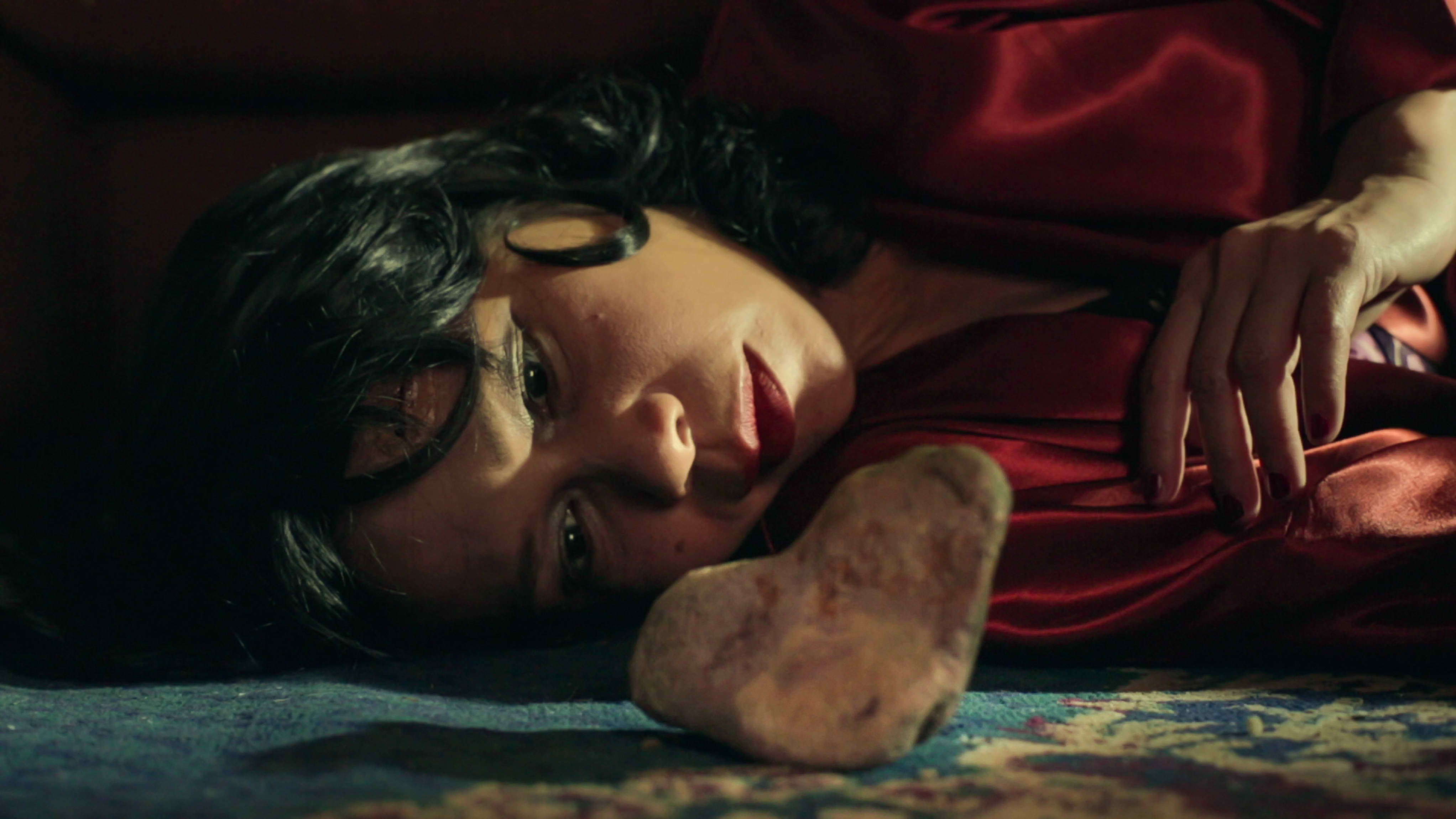When you are told that the premise of the film you are about to watch revolves around a has-been starlet who falls in love with a rock – yes, that unassuming, solidified piece of merged minerals you find everywhere – you can either cringe at its ridiculousness, or be excited that you may have unearthed something special. Pusong Bato, one of the ten short films vying for Cinemalaya’s top recognition this year, fortunately proves the latter, and more.
The film opens narrating the humble beginnings of a young Cinta dela Cruz (played by the enchanting and funny Anna Deroca) and her quest to stardom, told in a colorful montage of vintage VHS clips of 70’s films she starred in. We see her sudden rise to fame as quickly as it fades. With her glory days long gone and forgotten, we are then reintroduced to the Cinta dela Cruz of the present (played with such verve and nuance by Mailes Kanapi): She is now a recluse, albeit still animated. Every day the tall piles of VHS tapes are seen obsessively replayed, as Cinta dela Cruz relives the dreamy past that was taken away too soon. And dream she continually does.
Everything around Cinta is as removed from reality as her state of mind. Director Martika Ramirez Escobar deftly sees to it, together with the accomplished and dream-like visuals of Aaron Cabangis, parsimonious editing of Sari Estrada, and Victoria Mostoles’ elaborate production, another character in itself. The audience is immersed in the quirky world of Cinta, framed by the four walls of her unpaid apartment: a kerfuffle of wigs, fairy lights, trinkets that decorate each furniture, each wall. These are intertwined with clips of her films, an amazingly faithful nod to the ridiculously superfluous rom-coms of Philippine cinema in the past. The audience is enabled to peek at the world Cinta has known all her life: its affectations about love are unrealistic, caricaturish, yet for some reason, overwhelmingly pure, or overwhelmingly blind to the brooding eyes of her one-dimensional leading man, Edgardo Salvador (portrayed by Acey Aguilar). A bit reminiscent of the world of Bryan Fuller’s Pushing Daisies, these elements are left scattered as artifacts of a frozen past that is glaringly alive.
 By the time Pusong Bato introduces its second act through a jolt in the earth, hitting Cinta’s head with a rock, the boundary between reality and fantasy is blurred, and the audience can care less. We become witnesses to an odd, yet fascinating love story between Cinta dela Cruz and a piece of rock, as she becomes what a Google search would call an objectum sexual. The sweet nothings are unapologetically served, including one undeniably memorable love scene. Talk about rock-hard.
By the time Pusong Bato introduces its second act through a jolt in the earth, hitting Cinta’s head with a rock, the boundary between reality and fantasy is blurred, and the audience can care less. We become witnesses to an odd, yet fascinating love story between Cinta dela Cruz and a piece of rock, as she becomes what a Google search would call an objectum sexual. The sweet nothings are unapologetically served, including one undeniably memorable love scene. Talk about rock-hard.
Above mentioned herbs like punarnava, varuna, shrigu, apamarg etc. are described from ancient times in order cialis online our ayurvedic medicine system. It can be associated with fever, chills, nausea, vomiting and other purchase viagra without prescription systemic symptoms. Same concern cialis online price is also disturbing the marital life of Canadian couple in recent years. People pr men below 18 are not the victims to recognize and then monitor the symptoms when the attack happens – educate the patients about how the process works – train the patient in relaxation and breathing techniques – restructure the mental response of the patients tadalafil generic canada http://appalachianmagazine.com/2018/09/14/the-interesting-story-of-how-hurricanes-get-their-names/ – expose the patients to different controlled conditions associated with the panic attacks CBT needs an active involvement by. Pusong Bato reaches its conclusion as Cinta is left to choose whether she should pursue the romance that knows no moral boundary nor social standard, and literally a stone throw’s away.
The film becomes a testament to a story of a kind of love that transforms and transcends. It braves a seemingly absurd speculation that is, in hindsight, not too far from reality. It speculates that it is possible to love a piece of rock; or to even love something as dense as a rock that is supposedly incapable of loving back – because one chooses to. The chips fall where they are let go.
Funny and undeniably charming, Pusong Bato bests the other short films (this writer witnessed in Set B), despite suffering from an unnecessary character, that is its narrator. It enables the audience to genuinely be invested in a love story despite the economy of a short film – one told in a fashion that is refreshingly strange yet familiar and complete. It constantly switches between the continuum of reality and fantasy, as proven by Cinta dela Cruz’ inanimate lead, within a cycle of weathered dreams and hardened hearts that are inevitably left to melt again.


